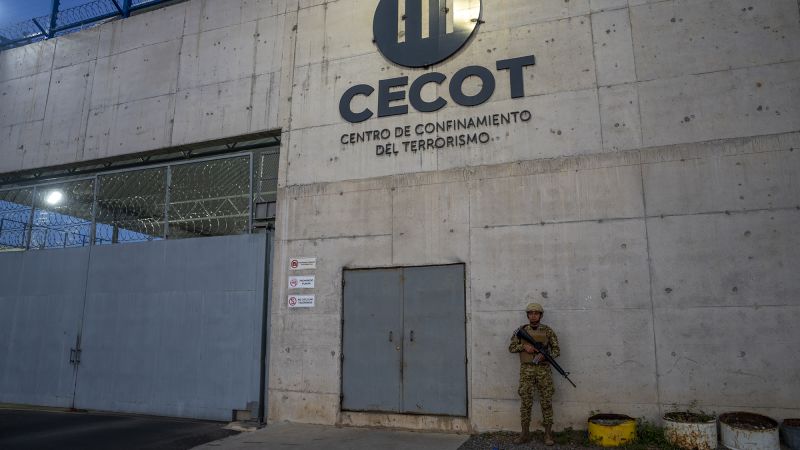Legal Experts Slam Offshore Prison Plan: No Constitutional Ground for Controversial Proposal
Politics
2025-04-17 08:00:36Content

As the Trump administration explores the controversial possibility of transferring violent American criminals to El Salvador's infamous mega-prison, legal scholars are emphatically warning that such a plan would be legally unfounded. Constitutional experts argue that the President lacks the legal authority to forcibly export domestic convicts outside of the United States judicial system.
The proposed strategy, which appears to target gang-related offenders, faces significant legal hurdles. Experts point out that unilateral deportation of citizens convicted of crimes would directly challenge fundamental constitutional protections and established legal precedents. The mega-prison in El Salvador, known for its harsh conditions and extreme overcrowding, has become a focal point of this potential policy, raising serious questions about human rights and judicial jurisdiction.
Legal professionals stress that the U.S. Constitution provides clear protections for citizens, regardless of their criminal status. Any attempt to circumvent these protections by sending convicted individuals to foreign detention facilities would likely face immediate and robust legal challenges in federal courts.
The proposal underscores the complex intersection of immigration policy, criminal justice, and constitutional law, highlighting the ongoing tensions within the Trump administration's approach to crime and punishment.
Legal Crossroads: The Controversial Proposal to Deport Violent Criminals to El Salvador
In the complex landscape of international law and criminal justice, the Trump administration's contemplation of a radical approach to handling domestic offenders has sparked intense legal and ethical debates, raising critical questions about the boundaries of presidential authority and the fundamental rights of American citizens.Unraveling the Legal and Humanitarian Implications of Unprecedented Deportation Strategy
Constitutional Challenges and Presidential Limitations
Legal scholars have emphatically underscored the constitutional impossibility of President Trump's proposed initiative to relocate violent criminals to El Salvador. The fundamental principles of due process and constitutional protections categorically prohibit such extraordinary measures. Constitutional experts argue that the executive branch lacks the legal mechanism to forcibly transfer American citizens to foreign jurisdictions, particularly in the context of criminal punishment. The proposed strategy fundamentally challenges established legal precedents and raises significant concerns about potential human rights violations. International law and bilateral agreements between the United States and El Salvador provide no legitimate framework for such unprecedented population transfers.El Salvador's Mega-Prison: A Humanitarian Concern
The notorious mega-prison in El Salvador represents a complex humanitarian challenge that extends far beyond simple deportation strategies. These correctional facilities are characterized by extreme overcrowding, severe human rights constraints, and conditions that dramatically deviate from international standards of humane imprisonment. Legal and human rights organizations have consistently documented the systemic challenges within El Salvador's penal system, highlighting overcrowding, limited access to basic necessities, and potential risks to individual safety. The proposed deportation strategy would potentially expose American citizens to environments that fundamentally contradict established principles of criminal rehabilitation and human dignity.Diplomatic and Geopolitical Ramifications
The proposed deportation initiative would inevitably strain diplomatic relations between the United States and El Salvador. Such a unilateral action could be perceived as a significant breach of international diplomatic protocols and potentially trigger complex legal and political negotiations. Diplomatic experts suggest that such a strategy would likely provoke substantial international criticism, potentially damaging the United States' reputation in global human rights discourse. The proposal represents a radical departure from established diplomatic practices and could compromise long-standing bilateral relationships.Legal and Ethical Implications of Forced Relocation
The concept of forcibly relocating American citizens to a foreign jurisdiction for criminal punishment represents an unprecedented legal challenge. Constitutional attorneys argue that such an action would directly contravene fundamental principles of citizenship, due process, and individual rights enshrined in the United States Constitution. The proposed strategy raises profound ethical questions about the extent of governmental authority and the protection of individual rights. Legal frameworks explicitly protect citizens from arbitrary punishment and ensure fundamental judicial safeguards, which would be fundamentally compromised by such a radical approach.Potential Long-Term Consequences
Beyond immediate legal challenges, the proposed deportation strategy could establish dangerous precedents for future executive actions. The potential normalization of such extraordinary measures might fundamentally undermine established legal protections and create significant uncertainties in the interpretation of citizenship rights. Societal implications extend beyond immediate legal considerations, potentially affecting broader perceptions of justice, rehabilitation, and the fundamental social contract between citizens and their government. The proposed strategy represents a radical reimagining of criminal justice that could have far-reaching and potentially destabilizing consequences.RELATED NEWS
Politics

Political Winds of Change: How Australians Are Reshaping Their Electoral Landscape
2025-05-01 12:59:11
Politics

Political Showdown: Trump-Backed Prosecutor Recruits Heavyweight Campaign Strategist
2025-04-16 19:37:36






